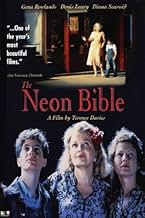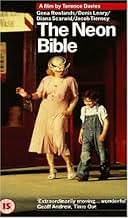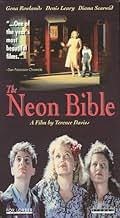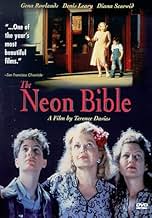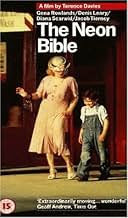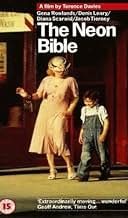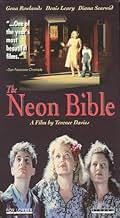अपनी भाषा में प्लॉट जोड़ेंWhile on a train, a teenage boy thinks about his life and the flamboyant aunt whose friendship acted as an emotional shield from his troubled family. This film evokes the haunting quality of... सभी पढ़ेंWhile on a train, a teenage boy thinks about his life and the flamboyant aunt whose friendship acted as an emotional shield from his troubled family. This film evokes the haunting quality of memory while creating a heartfelt portrait of a boy's life in a rural 1940s Southern town... सभी पढ़ेंWhile on a train, a teenage boy thinks about his life and the flamboyant aunt whose friendship acted as an emotional shield from his troubled family. This film evokes the haunting quality of memory while creating a heartfelt portrait of a boy's life in a rural 1940s Southern town.
- पुरस्कार
- 1 जीत और कुल 2 नामांकन
फ़ीचर्ड समीक्षाएं
The resulting film is disjointed, episodic and because of how internalized David is the plotting is hard to fully grasp. I am not sure if the plot is understandable if you *haven't* read the book. The material is about the oppressive nature of small town life for different people-especially fire and brimstone religion-builds up anger and resentment that comes out in violence. That comes across in the film if you know you are looking for it. If you not I think much of the film will be esoteric.
I ultimately ended up liking the film on the level of the companion to the novel. It helps a lot that I rather like the book and there's not much different in the works. The cinematic qualities are fairly good-if a little TV production. The melancholy of the novel comes through loud and clear.
Overall I am glad this film exists but it could have been better.
The movie has an odd filming style that didn't make it feel like a movie from 1995, instead it felt like it had been filmed in the 60s or 70s. Long, awkward shots, sets that were very clearly sets. I think the director was often going for something that felt ethereal and nearly dreamlike, which I guess makes sense since the movie is told as a memory. I didn't like the style of the movie at all but I'm sure there are some people out there who would enjoy it just because it isn't your standard film experience.
The main character is such a vacuum of personality. I only saw this a day or two ago and I can remember next to nothing about him. He's a soft child, deliberately so, so much so I was waiting for a reveal that he was gay but at least at the part of the movie I got to, that hadn't happened. It just seemed to fit with the rest of the narrative covering religious con-men, racism and the general sexism of the 1930s-50s in the deep south.
The father was a non-character for how little screentime he had in it except to be a bully who very quickly was disposed off in quite and unceremonious way. The mother as well was very much a non-character, going from pretty bland to 'insane' seemingly at the drop of the hat when the father left the movie. I thought they were really going to hammer in the point that he was the main bread winner and now they were alone, but their living situation never seemed to change except the mother now awkwardly stared at the camera for minutes at a time singing.
The Aunt is the main driving force of the movie as the boy's only friend. A city woman apparently slumming it in the south once her mediocre career as a bar singer ended. It's weird how they display her though, early on she's hated by the father because she dresses 'slutty' to a party and humiliates them in front of the town, allegedly but then for the rest of the movie, no one ever brings that up again and everyone seems rather content with her being around and she seems to become quite a major part of the town of heavily religious people who go to rallies calling out women who sing in bands... which would be her specifically, but no one seems to acknowledge that. They do make the point that because of this 'low standing' she has in society, she is used by men, they don't respect her at all and use her for a bit of fun before dropping her.
I had a problem with timescales in this movie. The boy starts as a child and an amount of time passes before a transition where he suddenly is a teenager and then an amount of time passes before I gave up. The timescale is all over the place which means that the story crawls along at times and then suddenly speeds by. World War 2 is covered in the space of about 2 minutes which is crucial to several characters and probably covers months of time. The 'racism' element shown was a 5 second cut away of the boy being taken to a lynching by his father, and it seriously is gone in seconds. The sexism and religious fear is covered more in depth with a rally but even then the movie is so blunt and heavy handed they make sure to show the religious preacher standing there going "Hahahah, so many suckers, I am going to milk them for so much money, hahahahaha." before going into the sermon. So, WW2 which has massive implications on the entire family is covered with basically one voice over narration but the religious conman scene is a solid 10 minute rally that seemingly has no long lasting effect on the plot.
This isn't the usual type of movie I would go for but I like to try new things occasionally. This was just quite a disappointment. Most movies I drop before finishing get an automatic 1 but I felt bad doing it for this movie because there were some odd elements in it that kept me vaguely interested since I had been originally thinking of dropping it 30 minutes in but the religious conman scene kept my interest for about another 20 or so minutes.
Davies is also, in my opinion, one of the few directors who accurately depicts the act of remembering. Without giving anything away, it's always important to keep in mind that David is on a train, thinking and remembering. No one remembers something from the past totally, memory functions like fragments and it's up to us to flesh them out. Sometimes we think of something one way, later another away; forget, remember or distort. David is fleshing out the events of his life and that's th most important thing about the film. Sometimes we remember minute, isolated events... Davies puts those in the film as well. Just sit back and enjoy the pace of this remarkable film from an equally remarkable and brilliant director.
A sheet blowing - music from Gone With the Wind - he turns into high drama; Stephen Foster's 'Hard Times' as David begins to hit bottom. It IS a musical - Davies has always used music for forward his narrative and uses it in this film in a more sophisticated way than in his earlier films to even more startling effect.
Everyone turns in remarkable performances - the entire cast and the photography is beyond amazing. Davies is the master of the tracking shot.
Please, be patient with the pace of the film - sit back and enjoy the ride. Get used to the rhythms and then give all of yourself to the film, jump in. It's beautiful, melancholy and sad. Davies' films are always so full of life and this is no exception. No idea why this film gets a bad rap - hands down, one of the greatest films of the 1990s. It's totally unique - it comes from nowhere. Shots, colors, textures - all perfect. Everything. Enjoy the ride.
The problem lies entirely at the feet of director Terence Davies . He directs in a poetic style or at least attempts to but where as a poetic film by Terewnce Malik or Sam Mendes works here it spectacular fails . . What sinks the film is the unnatural framing where a character is smack bang in the middle of the screen facing the camera . A lot of critics complain that a director like Danny Boyle shoots , frames and edits films in a similar manner but at least he brings a sense of variety to his movies . Here however Davies relies on the exact same framing technique throughout the entire film which sinks it as a cinematic presentation and feels more like a filmed theater play
क्या आपको पता है
- ट्रिवियाIn an interview with "Time Out Film", Terence Davies said about this film, "[It] doesn't work, and that's entirely my fault. The only thing I can say is that it's a transition work. And I couldn't have done The House of Mirth (2000) without it."
- भाव
David, aged 15: If you were different from anybody else in town, you had to get out. They used to say in school, "you have to think for yourself," but you couldn't do that in town. You have to think what your father thought and that was what everybody thought.
- कनेक्शनFeatured in Fandor: Cannes You Dig It? | Fandor Spotlight (2022)
- साउंडट्रैकOh Lord, How Long?
Traditional
टॉप पसंद
- How long is The Neon Bible?Alexa द्वारा संचालित
विवरण
बॉक्स ऑफ़िस
- US और कनाडा में सकल
- $78,072
- US और कनाडा में पहले सप्ताह में कुल कमाई
- $5,045
- 3 मार्च 1996
- दुनिया भर में सकल
- $78,072
- चलने की अवधि1 घंटा 31 मिनट
- रंग
- ध्वनि मिश्रण
- पक्ष अनुपात
- 2.35 : 1
इस पेज में योगदान दें


